AVDEY
THE OMNIDIRECTIONAL SOUND OF TRANSFORMATION
di Giampiero Fleba
Previsione possibile se vi sintonizzate: una chiara circostanza percettiva dentro la musica di Avdey. Nome emergente nella corrente evolutiva dell’underground planetario. Il loro debutto “Gates Of Horn And Ivory” è un album tra i più coinvolgenti di questi primi mesi del 2021 nonchè di motivazione al contatto per conoscere meglio i principali artefici di questi suoni espansi, sensibili ad  elementi di space rock e psichedelia progressiva con sfumature ambient etno-cosmiche. Magici crossover multidimensionali per curiosi mindtravellers non solo sulle onde di frequenze emesse ma anche di incontro con differenti culture. Ne parliamo con Leonardo Ramos a partire dalla genesi del progetto e dalle presentazioni…
elementi di space rock e psichedelia progressiva con sfumature ambient etno-cosmiche. Magici crossover multidimensionali per curiosi mindtravellers non solo sulle onde di frequenze emesse ma anche di incontro con differenti culture. Ne parliamo con Leonardo Ramos a partire dalla genesi del progetto e dalle presentazioni…
LR (A) Permettimi di presentare i componenti del gruppo: abbiamo Mustapha Denguezly, alla chitarra, sintetizzatori, percussioni e batteria, Adel Boujemaâ al basso e io alla sezione fiati. Mustapha e Adel provengono da diverse città della Tunisia, e io sono metà brasiliano e metà neozelandese. Nessuno di noi si è mai incontrato di persona! Mustapha e Adel si sono conosciuti online, circa 15 anni fa: hanno lavorato insieme su un’idea che non è decollata per dirigersi poi su Avdey, un nuovo progetto a cui si stavano dedicando poco prima della pandemia. Intorno alla metà del 2020 io stavo promuovendo online un altro mio progetto, una band di musica irlandese psichedelica chiamata Harmundi. Attraverso questi canali Mustapha ha conosciuto il mio lavoro e alla fine mi ha invitato a unirmi con loro in Avdey. Quindi, proveniamo tutti da background culturali e musicali abbastanza diversi, ma condividiamo comunque un interesse per la musica psichedelica e questo tema della trasformazione psicologica, o “rinascita psichedelica”, di cui sempre più persone parlano in tutto il mondo. Questo è il nostro “terreno comune” in seno alla nascita di “Gates Of Horn And Ivory” in cui ognuno di noi ha la libertà assoluta di suonare quello che vuole.
A cosa si ispira il nome del gruppo?
LR (A) Come mi ha spiegato Adel, la parola Avdey significa “trasformazione” in lingua Tamazight parlata dai Tuareg, il vero popolo del nord Africa. È la lingua parlata in quella regione prima che fosse conquistata dagli Arabi, e ci sono ancora persone che la parlano. In Tunisia, la lingua parlata è in realtà un misto tra Tamazight e Arabo.
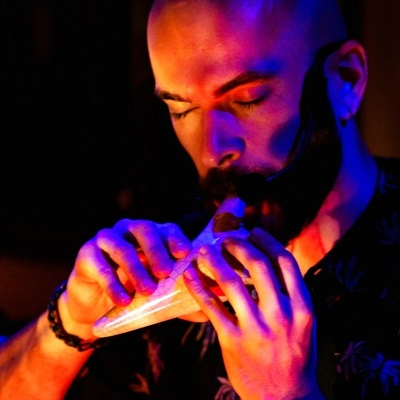 Come si è sviluppata la vostra musica, l’idea che vi unisce anche a distanza nel processo creativo di “Gates Of Horn And Ivory”?
Come si è sviluppata la vostra musica, l’idea che vi unisce anche a distanza nel processo creativo di “Gates Of Horn And Ivory”?
LR (A) Poiché dovevamo fare tutto sulla base della condivisione di file, l’album è stato prodotto in un modo in cui ognuno di noi aveva pochissimo controllo o influenza su ciò che l’altro stava facendo. Ci siamo concentrati maggiormente su cosa aggiungere alla miscela in modo da valorizzare il prodotto complessivo e anche spingerlo verso una direzione inaspettata. Ad esempio, volevo portare il mio background di musica irlandese (che personalmente considero un genere stranamente psichedelico in sé… sto divagando) ma non volevo esagerare fino al punto di trascinare l’album in un logoro “celtic chillout”. Quindi ho anche cercato di controbilanciare questo con alcune idee dal jazz, dalla musica dei nativi americani e persino dal tango (in futuro aggiungerò anche qualcosa di vaporwave). Nel frattempo, Mustapha e Adel cercavano lo stesso tipo di equilibrio, usando le loro influenze musicali rock, krautrock, metal, shoegaze, musica orientale, musica psichedelica… Era come creare un cibo collettivo con varie spezie di culture diverse senza renderlo troppo dolce o troppo salato o troppo familiare. Per inciso, Mustapha è anche uno chef! In molti modi, è ciò che questa musica significa per noi: culture diverse, separate da distanze fisiche, che si ascoltano e si strutturano a vicenda, che risuonano insieme. L’era in cui viviamo, nota come era post-moderna, è quella in cui il mondo intero ha un accesso facile e immediato alle informazioni e alla cultura da tutto il mondo, e questo tipo di 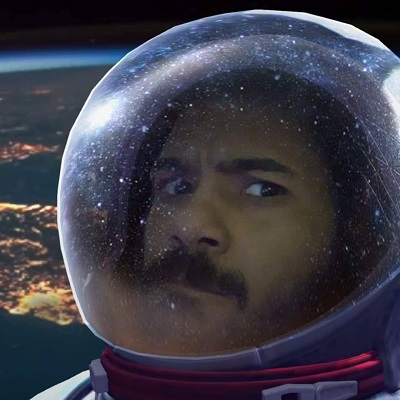 globalizzazione può essere un coltello a doppio taglio: da un lato, le persone stanno sperimentando una mancanza di stabilità, stanno diventando sempre più ansiose, depresse, spaventate e perdono il contatto con se stesse e la loro umanità, il che spiega così tanto odio, intolleranza, teorie del complotto e problemi di salute mentale che vediamo; ma d’altra parte, questa età può anche essere vista come un invito per noi a lasciare andare il nostro attaccamento a ciò che ci aspettiamo che sia il mondo e a come ci aspettiamo che siano le altre persone, e concentrarci su come possiamo trarre vantaggio da questa globale interconnessione per saperne di più sull’umanità e per capire meglio cosa possiamo aggiungere. Questa non è un’idea essenzialmente nuova nella musica: molti dei nostri riferimenti più influenti si occupano anche di fondere senza soluzione di continuità diverse influenze musicali – ma credo che non ci sia mai stato un momento migliore per parlare di “rinascita psichedelica”, “trasformazione psicologica” e l’incontro dell’umanità in tutto il mondo.
globalizzazione può essere un coltello a doppio taglio: da un lato, le persone stanno sperimentando una mancanza di stabilità, stanno diventando sempre più ansiose, depresse, spaventate e perdono il contatto con se stesse e la loro umanità, il che spiega così tanto odio, intolleranza, teorie del complotto e problemi di salute mentale che vediamo; ma d’altra parte, questa età può anche essere vista come un invito per noi a lasciare andare il nostro attaccamento a ciò che ci aspettiamo che sia il mondo e a come ci aspettiamo che siano le altre persone, e concentrarci su come possiamo trarre vantaggio da questa globale interconnessione per saperne di più sull’umanità e per capire meglio cosa possiamo aggiungere. Questa non è un’idea essenzialmente nuova nella musica: molti dei nostri riferimenti più influenti si occupano anche di fondere senza soluzione di continuità diverse influenze musicali – ma credo che non ci sia mai stato un momento migliore per parlare di “rinascita psichedelica”, “trasformazione psicologica” e l’incontro dell’umanità in tutto il mondo.
Il titolo evoca la mitologia greca e i poemi epici: “le porte del sonno” attraverso le quali escono i sogni con i loro messaggi di illusione (avorio) o realtà (corno). Cosa vi ha portato ad essere ispirati da questa dimensione epica? C’è anche una riflessione sulla società contemporanea?
LR (A) Naturalmente, ci siamo assicurati di lasciare un pò di generoso margine di manovra per l’interpretazione, ma sì; stiamo cercando di elaborare intorno al tema di “illuminazione spirituale”, “consapevolezza”, “salute mentale” o al molto attuale “mindfulness”, sebbene evitiamo qualsiasi quadro specifico per interpretare questa esperienza profondamente umana di unità 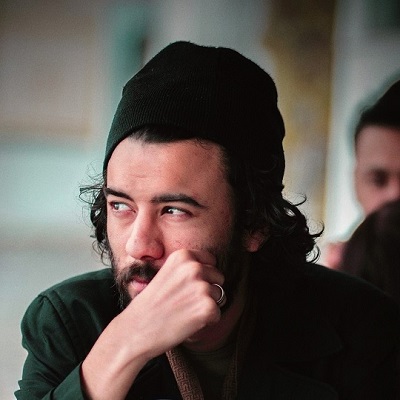 con il sé e tutto il resto. Diciamo che, essendo un divulgatore scientifico professionista, non sono affatto convinto che lo “spirito” sia qualcosa che esiste, ma sono ugualmente affascinato dalla mente, dalla coscienza e da tutto il pacchetto che ne deriva – il che significa che posso ancora relazionarmi e perseguire con entusiasmo un’esperienza “spirituale” anche se non sono un grande fan della parola stessa. Questo è ciò di cui parla la “rinascita psichedelica”: non i concetti superficiali che separano l’umanità, ma le esperienze che la mettono insieme. E, naturalmente, i motivi di “sogno”, “realtà” e “illusione” sono grandi esempi di tutta questa logica: molte filosofie non vedono una vera distinzione tra sogno e realtà – e molte incoraggiano l’esplorazione dei sogni come un modo per “entrare” ed essere in contatto con una “verità superiore”. Questo particolare messaggio può provenire dalla mitologia greca tanto quanto dalla filosofia buddista, dalla psicoanalisi, dalle neuroscienze o dalla pratica piuttosto secolare dei sogni lucidi (un mio hobby personale). Quando sogniamo, stiamo effettivamente sperimentando una messa in atto sensoriale della nostra mente subconscia profonda, il nostro sé più intimo e più vero – se diventiamo lucidi in quel sogno, abbiamo una rapida realizzazione che la realtà è solo un’illusione, in quanto il corpo che vediamo e le situazioni in cui ci troviamo sono in realtà solo allucinazioni della nostra mente … e più sperimentiamo con il sogno e la realtà, più arriviamo alla conclusione che, anche quando siamo svegli, è sempre la stessa grande illusione. Mette tutto in una prospettiva molto bella … che ci fa chiedere perché prendiamo tutto così sul serio. Pensiamo che
con il sé e tutto il resto. Diciamo che, essendo un divulgatore scientifico professionista, non sono affatto convinto che lo “spirito” sia qualcosa che esiste, ma sono ugualmente affascinato dalla mente, dalla coscienza e da tutto il pacchetto che ne deriva – il che significa che posso ancora relazionarmi e perseguire con entusiasmo un’esperienza “spirituale” anche se non sono un grande fan della parola stessa. Questo è ciò di cui parla la “rinascita psichedelica”: non i concetti superficiali che separano l’umanità, ma le esperienze che la mettono insieme. E, naturalmente, i motivi di “sogno”, “realtà” e “illusione” sono grandi esempi di tutta questa logica: molte filosofie non vedono una vera distinzione tra sogno e realtà – e molte incoraggiano l’esplorazione dei sogni come un modo per “entrare” ed essere in contatto con una “verità superiore”. Questo particolare messaggio può provenire dalla mitologia greca tanto quanto dalla filosofia buddista, dalla psicoanalisi, dalle neuroscienze o dalla pratica piuttosto secolare dei sogni lucidi (un mio hobby personale). Quando sogniamo, stiamo effettivamente sperimentando una messa in atto sensoriale della nostra mente subconscia profonda, il nostro sé più intimo e più vero – se diventiamo lucidi in quel sogno, abbiamo una rapida realizzazione che la realtà è solo un’illusione, in quanto il corpo che vediamo e le situazioni in cui ci troviamo sono in realtà solo allucinazioni della nostra mente … e più sperimentiamo con il sogno e la realtà, più arriviamo alla conclusione che, anche quando siamo svegli, è sempre la stessa grande illusione. Mette tutto in una prospettiva molto bella … che ci fa chiedere perché prendiamo tutto così sul serio. Pensiamo che 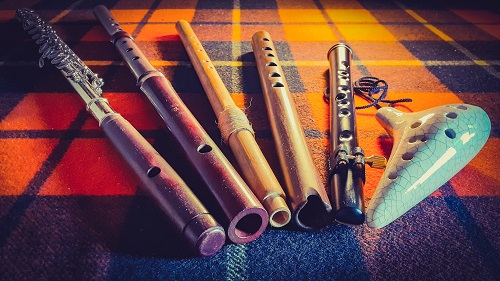 questo tipo di distacco, di sperimentare la realtà come un sogno, sia una parte importante di questo processo di rinascita, trasformazione, unione, qualunque cosa. È interessante che tu lo chiami epico: è epico, perché tanto è stato detto su questo da quando l’umanità ha imparato a parlare … ma è anche una cosa così personale e intima per ognuno di noi. È un viaggio verso l’esterno che alla fine porta dentro – o un viaggio verso l’interno che porta invariabilmente a un’esperienza “onnicomprensiva”.
questo tipo di distacco, di sperimentare la realtà come un sogno, sia una parte importante di questo processo di rinascita, trasformazione, unione, qualunque cosa. È interessante che tu lo chiami epico: è epico, perché tanto è stato detto su questo da quando l’umanità ha imparato a parlare … ma è anche una cosa così personale e intima per ognuno di noi. È un viaggio verso l’esterno che alla fine porta dentro – o un viaggio verso l’interno che porta invariabilmente a un’esperienza “onnicomprensiva”.
Musicalmente le vostre canzoni esplorano il mondo attraverso visioni space rock ambient etnopsichedeliche: dal medioriente di ‘The Gate’ e ‘Nafas’ ai bagliori jazz di ‘Icaro’ e ‘Zenith’, al folk nordico di ‘Komdu Með’ con testo in Islandese, all’India di ‘Iaganmata’, al rituale ipnotico sciamanico di ‘Yapa’, al finale kosmische di ‘Hamartia’. Ci puoi raccontare di questo incontro della vostra musica con differenti culture?
LR (A) L’album è stato pensato come questo viaggio interiore immersivo – che può essere di natura psichedelica, meditativa o spirituale allo stesso modo. Quindi le tracce sono state create per riflettere questo, sia nella loro natura musicale individuale, sia quando si trattava della stessa disposizione della tracklist. “The Gate” è la tua prima soglia: è sia l’invito che la frontiera che bisogna varcare quando si inizia un viaggio del genere. E il primo passo è respirare (Nafas): il respiro ti radica nel qui e ora, stimola la consapevolezza e inizia ad avvicinarci a noi stessi. Quindi, ogni nuova traccia è un nuovo passo in quel viaggio, e ci piace il fatto che ogni ascoltatore possa colmare le lacune interpretative in questo viaggio ed essere portato sempre più in profondità. Il 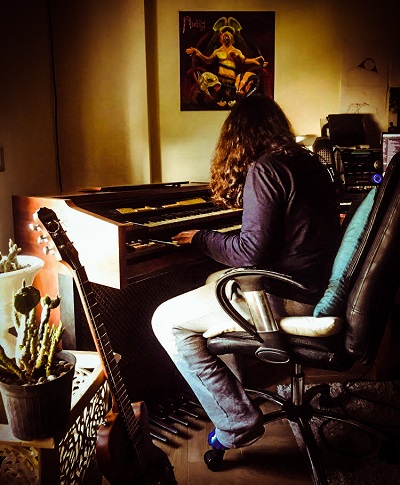 viaggio interiore è pieno di gioia, ma è anche pieno di stranezza, di idee così lontane eppure così stranamente vicine… può essere pacifico e riflessivo a volte, ma può anche essere irregolare e intenso. In definitiva, questo viaggio riguarda il lasciar andare e trovare una saggezza interiore da riportare alla superficie della coscienza. “Yapa” è una parola mapuche cilena, che significa “ciò che viene dato senza impegno”, una specie di regalo che non è stato chiesto. E nel contesto del suo significato, questo titolo deriva anche da una circostanza speciale perchè nella canzone ho usato un flauto di quena che una volta ho trovato per terra, nel profondo di una foresta in Cile, con nessun’altra persona in giro per rivendicarlo. Mi piace pensare a quel flauto come uno “yapa” stesso, un dono che ho ricevuto dalla foresta, dalla vita o da qualche flautista distratto. In ogni caso, stiamo parlando di un viaggio che pervade tutta la mitologia dell’umanità in tutto il mondo, quello che l’antropologo Joseph Campbell ha chiamato il “monomito” – e questo viaggio è così ricorrente proprio perché affronta lo stesso problema in ogni mente umana: noi tutti abbiamo bisogno di viaggiare verso l’interno come un modo per trovare pezzi della nostra umanità e per integrare meglio con noi stessi e con gli altri umani. Oppure, per tornare all’antica Grecia e per dirla con le parole dell’Oracolo di Delfi, è un invito a “conoscere te stesso”.
viaggio interiore è pieno di gioia, ma è anche pieno di stranezza, di idee così lontane eppure così stranamente vicine… può essere pacifico e riflessivo a volte, ma può anche essere irregolare e intenso. In definitiva, questo viaggio riguarda il lasciar andare e trovare una saggezza interiore da riportare alla superficie della coscienza. “Yapa” è una parola mapuche cilena, che significa “ciò che viene dato senza impegno”, una specie di regalo che non è stato chiesto. E nel contesto del suo significato, questo titolo deriva anche da una circostanza speciale perchè nella canzone ho usato un flauto di quena che una volta ho trovato per terra, nel profondo di una foresta in Cile, con nessun’altra persona in giro per rivendicarlo. Mi piace pensare a quel flauto come uno “yapa” stesso, un dono che ho ricevuto dalla foresta, dalla vita o da qualche flautista distratto. In ogni caso, stiamo parlando di un viaggio che pervade tutta la mitologia dell’umanità in tutto il mondo, quello che l’antropologo Joseph Campbell ha chiamato il “monomito” – e questo viaggio è così ricorrente proprio perché affronta lo stesso problema in ogni mente umana: noi tutti abbiamo bisogno di viaggiare verso l’interno come un modo per trovare pezzi della nostra umanità e per integrare meglio con noi stessi e con gli altri umani. Oppure, per tornare all’antica Grecia e per dirla con le parole dell’Oracolo di Delfi, è un invito a “conoscere te stesso”.
La vostra strumentazione è piuttosto complessa in accordo anche a dimensioni sonore tipiche della musica progressiva dove le barriere tra i generi svaniscono in un intrigante scenario di confluenze. Si sentono anche vari tipi di flauto ed è interessante come questo strumento sia ritornato di attualità nel suono di molti gruppi. Usate anche altri strumenti acustici?
LR (A) Mustapha utilizza anche una gamma piuttosto ampia di percussioni acustiche. Per quanto riguarda i flauti, suono il classico traverso di Boehm, un flauto irlandese in legno, un fischietto di latta, un’ocarina, un flauto dei nativi americani, uno 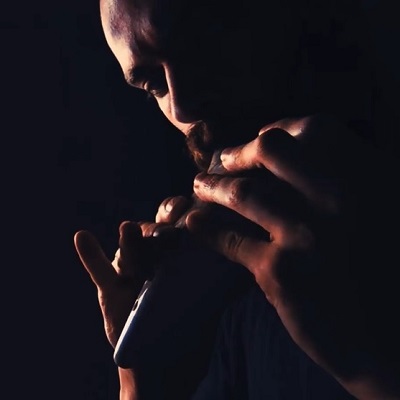 Xaphoon, uno Xun cinese e una quena cilena. Il mio interesse per gli strumenti a fiato è venuto da musicisti come Ian Anderson, flautista, cantante e frontment dei Jethro Tull, che sono ampiamente rinomati per aver mescolato queste dimensioni etniche con le radici del rock’n’roll. Penso che i legni in generale possano essere introdotti come un modo per aggiungere “aromi” alla miscela: a volte controbilanciare la ruvidità della chitarra elettrica, o talvolta aggiungendo una dimensione extra alla definizione di rugosità. In generale, gli strumenti acustici portano una sorta di “elemento di sorpresa” a un normale ensemble rock, motivo per cui possono essere ottimi per ravvivare le cose – ma possono anche essere pericolosi: se lo stesso elemento di sorpresa viene usato troppo spesso, allora non c’è sorpresa. Attualmente stiamo lavorando a una nuova traccia con l’aggiunta speciale di una chitarra acustica accordata in DADGAD, un’accordatura molto comune per la musica tradizionale irlandese.
Xaphoon, uno Xun cinese e una quena cilena. Il mio interesse per gli strumenti a fiato è venuto da musicisti come Ian Anderson, flautista, cantante e frontment dei Jethro Tull, che sono ampiamente rinomati per aver mescolato queste dimensioni etniche con le radici del rock’n’roll. Penso che i legni in generale possano essere introdotti come un modo per aggiungere “aromi” alla miscela: a volte controbilanciare la ruvidità della chitarra elettrica, o talvolta aggiungendo una dimensione extra alla definizione di rugosità. In generale, gli strumenti acustici portano una sorta di “elemento di sorpresa” a un normale ensemble rock, motivo per cui possono essere ottimi per ravvivare le cose – ma possono anche essere pericolosi: se lo stesso elemento di sorpresa viene usato troppo spesso, allora non c’è sorpresa. Attualmente stiamo lavorando a una nuova traccia con l’aggiunta speciale di una chitarra acustica accordata in DADGAD, un’accordatura molto comune per la musica tradizionale irlandese.
Interessante! Come quella suonata da Jimmy Page in varie canzoni dei Led Zeppelin come ‘White Summer’, ‘Black Mountain Side’ e ‘Kashmir’… E’ comunque notevole la qualità e l’equilibrio acustico – elettrico – elettronico del vostro suono in cui operano anche field recordings. Tutto ciò sembra esprimere qualcosa di spirituale e organico, una relazione con la Natura e l’ambiente?
LR (A) Volevamo rendere l’intero album un’esperienza il più coinvolgente possibile, in modo che le persone potessero essere 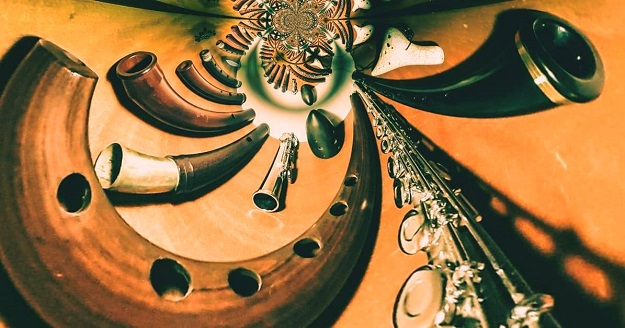 accompagnate, come in un viaggio. Onestamente, penso che Mustapha sia il più grande responsabile di questo risultato complessivo: ha fatto un lavoro straordinario con il missaggio e il mastering, lavorando attentamente e meticolosamente su sovrapposizioni, bilanciamento, dinamica e panoramica audio (panning). E questo fa sì che l’intero album sia un prodotto indipendente al 100%, tra l’altro! Consiglio vivamente di ascoltarlo completamente, con buoni auricolari, almeno una volta! L’album parla dell’esperienza e sì, coinvolge la natura, l’ambiente, la spiritualità e quell’auto immersione di cui parlavo prima.
accompagnate, come in un viaggio. Onestamente, penso che Mustapha sia il più grande responsabile di questo risultato complessivo: ha fatto un lavoro straordinario con il missaggio e il mastering, lavorando attentamente e meticolosamente su sovrapposizioni, bilanciamento, dinamica e panoramica audio (panning). E questo fa sì che l’intero album sia un prodotto indipendente al 100%, tra l’altro! Consiglio vivamente di ascoltarlo completamente, con buoni auricolari, almeno una volta! L’album parla dell’esperienza e sì, coinvolge la natura, l’ambiente, la spiritualità e quell’auto immersione di cui parlavo prima.
Pensate di pubblicare il vostro album anche su supporto fisico?
LR (A) Attualmente stiamo studiando la possibilità di stampare CD, vinili e cassette e venderli per il mercato tunisino ed europeo (forse espandendo in seguito). Non sappiamo ancora se tutto ciò sarà effettivamente fattibile, ma ci stiamo sicuramente lavorando. E, naturalmente, saremo anche disponibili su tutte le principali piattaforme di streaming (e dovrebbe essere da un giorno all’altro).

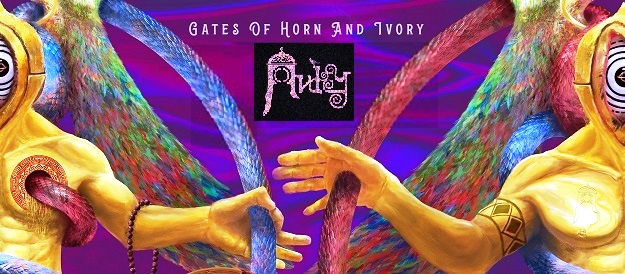
English translation…
AVDEY
THE OMNIDIRECTIONAL SOUND OF TRANSFORMATION
by Giampiero Fleba
Possible prediction if you tune in: a clear perceptual circumstance within Avdey’s music. Emerging band in the evolutionary current of the planetary underground. Their debut “Gates Of Horn And Ivory” is one of the most immersive albums of these first months of 2021 as well as reason to contact to learn more about the main architects of these expanded sounds, sensitive to elements of space rock and progressive psychedelia with ethno-cosmic ambient shades. Magical multidimensional crossovers for curious mindtravellers not only on the waves of frequencies emitted but also of encounters with different cultures. We talk about it with Leonardo Ramos starting from the genesis of the project and from the introductions…
LR (A) Let me briefly introduce the band members: we have Mustapha Denguezly, on the guitar, synthesizers, percussion and drums, Adel Boujemaâ on the bass, and me on the winds section. Mustapha and Adel are from different cities in Tunisia, and I’m half Brazilian and half Kiwi… and none of us have ever met in person! Mustapha and Adel met each other online, some 15 years ago: they’ve worked together on another project that didn’t take off, before moving on to Avdey, a new thing that they was working on just before the Pandemics. Shortly after, around mid 2020, I found myself doing a lot of online marketing for another project of mine, a psychedelic Irish music band called Harmundi – which is how Mustapha got to know my work and eventually invited me to join them in Avdey. So, we all came from quite different cultural and musical backgrounds, but nonetheless share an interest in psychedelic music and this theme of psychological transformation, or “psychedelic rebirth”, that more and more people are talking about worldwide. Actually, the word Avdey means “transformation”. The language is Tamazight, spoken by the Tuareg, the true people of north Africa. It’s the language that was spoken in that region before it was invaded by the Arabs, and there are still people who speak it there. In Tunisia, the language we speak is actually a mix between Tamazight and Arabic. That’s our “common ground”, but, aside from it, each of us has absolute freedom to play whatever we want, and that’s pretty much how “Gates Of Horn And Ivory” came about.
What is the name of the group inspired by?
LR (A) As Adel explained to me, the language is Tamazight, spoken by the Tuareg, the true people of north Africa. It’s the language that was spoken in that region before it was invaded by the Arabs, and there are still people who speak it there. In Tunisia, the language we speak is actually a mix between Tamazight and Arabic.
How your music developed, how the different cultures of your musical roots came together, the idea that unites you, the creative process that led you to “Gates Of Horn And Ivory”?
LR (A) Because we had to do everything on a file-sharing basis, the album was produced in a way where each of us had very little control or influence over what the other was doing. Instead, we could focus more on what to add to the mixture so as to value the overall product and also pull it to some unexpected direction. For instance, I wanted to bring in my background in Irish music (which I personally regard as an oddly psychedelic genre in itself, but I digress) but I didn’t want to overdo it to the point of dragging the album down the old “celtic chillout” road. So I also tried to counterbalance that with some ideas from jazz, Native American music, and even tango (in the future, I’ll be adding vaporwave to that list as well). Meanwhile, Mustapha and Adel strived for the same sort of balance, using their own musical spices from rock, krautrock, metal, shoegaze, eastern music, psychedelic music, etc. It was like making a collaborative dish with different spices from different cultures and not letting it become too sweet or too salty or too familiar. Incidentally, Mustapha is also a chef! In many ways, this is what this music means to us: different cultures, separated by physical distances, listening to each other, building on top of each other, resonating together. The age we live in, known as the Postmodern Age, is one where the whole world has easy and instant access to information and culture from all over the globe, and this kind of globalization can be a two-edged knife: on one hand, people are experiencing lost solidities, are becoming increasingly anxious, depressed, afraid and losing touch with themselves and their humanity, which accounts for so much hate, intolerance, conspiracy theories and mental health issues we see; but on the other hand, this age can also be seen as an invitation for us to let go of our attachment to what we expect the world to be and how we expect other people to be, and focus on how we can benefit from this global interconnectedness to learn more about humanity and to better figure out what we can add. This is not an essentially new idea in music: many of our most influential references are also on the business of seamlessly merging different musical influences – but I do believe there’s never been a better time to talk about “psychedelic rebirth”, “psychological transformation” and the coming together of humanity worldwide.
The title leads to Greek mythology and epic poems: ‘the gates of sleep’ through which dreams come out with their messages of illusion (ivory) or reality (horn). Very interesting. What led you to be inspired by this epic dimension? Is there also a reflection on the contemporary society?
LR (A) Naturally, we made sure to leave some generous bit of leeway for interpretation, but yes; we’re trying to elaborate around the theme of “spiritual enlightenment”, “awareness”, “mental health”, or the trendier “mindfulness” – although avoiding any specific framework for interpreting this deeply human experience of oneness with the self and everything else. Let’s say that, being a professional science communicator, I’m not at all convinced that “spirit” is something that exists, but I’m all the same fascinated by the mind, by consciousness and the whole package that comes along – which means I can still relate to and eagerly pursue a “spiritual” experience even though I’m not a big fan of the word itself. This is what that “psychedelic rebirth” is about: not the superficial concepts that separate humanity, but the experiences that bring it together. And, of course, the motifs of “dream”, “reality” and “illusion” are great illustrations of that whole logic: many philosophies see no real distinction between dream and reality – and many encourage the exploration of dreams as a way to “go in” and get in touch with a “higher truth”. This particular message can come about through Greek mythology just as much as from Buddhist philosophy, from psychoanalysis, from neuroscience or from the rather secular practice of lucid dreaming (a personal hobby of mine). When we dream, we are actually experiencing a sensorial enactment of our deep subconscious mind, our innermost and truest self – if we become lucid in that dream, we have a quick realization that reality is just an illusion, in that the body we see and the situations we find ourselves in are actually just hallucinations of our minds… and the more we experiment with dream and reality, the more we come to that conclusion that, even when we are awake, it’s still the same big illusion. It just puts everything into a very nice perspective… one that has us wondering why we take it all so seriously. We think this kind of detachment, of experiencing reality as a dream, is a big part of this process of rebirth, transformation, coming together, whatever. It’s interesting that you call it epic: it IS epic, because so much has been said about this since humanity learned how to talk… but it’s also such a personal and intimate thing for each of us. It’s an outward journey that ultimately leads in – or an inward journey that invariably leads to an “all-encompassing” experience.
Musically your songs expand into a fantastic ethnopsychedelic-ambient-space rock journey: from the Middle East of ‘The Gate’ (where you can see echoes of Ozric Tentacles) and ‘Nafas’ (beautiful also in its meaning ‘breath’) to the jazzy flashes of ‘Icaro’ and ‘Zenith’, to the Nordic folk of ‘Komdu Með’ with text in Icelandic, to the India of ‘Iaganmata’ (mother and protector of the cosmic world), to the hypnotic shamanic ritual of ‘Yapa’, to the kosmische ending of ‘Hamartia’. Can you tell us about this meeting of your music with different cultures?
LR (A) The album was thought of as this immersive inner journey – which can be of a psychedelic, meditative or a spiritual nature alike. So the tracks were created to reflect that, both in their individual musical natures, and when it came to the tracklist arrangement itself. “The Gate” is your first threshold: it’s both the invitation and the frontier one must cross when starting a journey like that. And the first step is to breathe: the breath grounds you in the here and now, it stimulates awareness and starts to bring us closer to ourselves. Then, each new track is a new step in that journey, and we like the fact that each listener can fill in the interpretive gaps on this journey and be taken deeper and deeper in. The inner journey is full of joy, but it’s also full of strangeness, of ideas so distant and yet so oddly close… it can be peaceful and reflective at times, but it can also be bumpy and intense. Ultimately, this journey is about letting go and finding some inner wisdom to be brought back to the surface of consciousness. “Yapa” is a Chilean Mapuche word, which means “that which is given without obligation”… kind of like a gift that wasn’t asked for. This name evokes the intention behind the track in this overall context, but also comes from a special particularity: for that track, I used a quena flute, one that I once found lying alone on the ground, deep inside a forest in Chile, with no other person around to claim it. I like to think of that flute as a “yapa” itself, a gift I received from the forest, from life or from some unattentive flutist. In any case, we’re talking about a journey that pervades all of humanity’s mythology worldwide, what anthropologist Joseph Campbell has called the “monomyth” – and this journey is so recurring precisely because it addresses the same issue in every human mind: we all need to journey inwards as a way to find bits of our own humanity and become better integrated with ourselves and with the other humans. Or, to go back to Ancient Greece and to put it in the words of the Oracle of Delphi, it’s an invitation to “know thyself”.
Your musical equipment is quite complex according to the typical sound dimensions of progressive music where the barriers between genres vanish in an intriguing scenario of confluences. Various types of flute are also heard and it is interesting how this instrument has returned to the present in the sound of many groups. Do you also use other acoustic instruments?
LR (A) Mustapha also uses a pretty wide range of acoustic percussions. As for the flutes, we have the classic Boehm transverse, a wooden Irish flute, a tin whistle, an ocarina, a Native American flute, a Xaphoon, a Chinese Xun and a Chilean quena. My interest in wind instruments came from musicians such as Ian Anderson (Jethro Tull’s flutist, singer and frontment), who are remarkably renowned for blending these ethnic dimensions with rock’n’roll roots. I think woodwinds in general can be brought in as a way to add “spice” to the mixture: sometimes counterbalancing the roughness of the electric guitar, or sometimes adding an extra dimension to the definition of roughness. In general, acoustic instruments bring a sort of “element of surprise” to a regular rock ensemble, which is why they can be great for spicing things up – but they can also be dangerous: if the same element of surprise is used too often, then there’s no surprise. We’re currently working on a new track with a special addition of an acoustic guitar tuned in DADGAD (a very common tuning for Irish traditional music).
Very interesting! Like the one played by Jimmy Page in various Led Zeppelin songs such as ‘White Summer’, ‘Black Mountain Side’ and ‘Kashmir’. The acoustic – electrical – electronic balance of your sound (where sometimes field recordings also appear) is remarkable. Does all this seem to express something spiritual and organic, a relationship with Nature and the environment?
LR (A) We wanted to make the whole album as immersive an experience as we could – so that people could be taken along with it, like in a trip. Honestly, I think Mustapha is the biggest responsible for this overall result: he did an amazing job with the mixing and mastering, carefully and meticulously working the layerings, balance, dynamics, and pannings. And that makes the whole album 100% independently produced, by the way! I really recommend listening to the whole thing in one go, with good earphones, at least once! The album is about experience, and yes, that involves Nature, the environment, spirituality and that self immersion I was talking about earlier.
Do you plan to publish your album also on physical support?
LR (A) We’re currently studying the viability of printing CDs, vinyls and cassettes and selling them for the Tunisian and European markets (maybe expanding later). We still don’t know if all of these will actually be viable, but we’re definitely working on it. And, of course, we’ll also be available on all main streaming platforms (and that should be any day now).